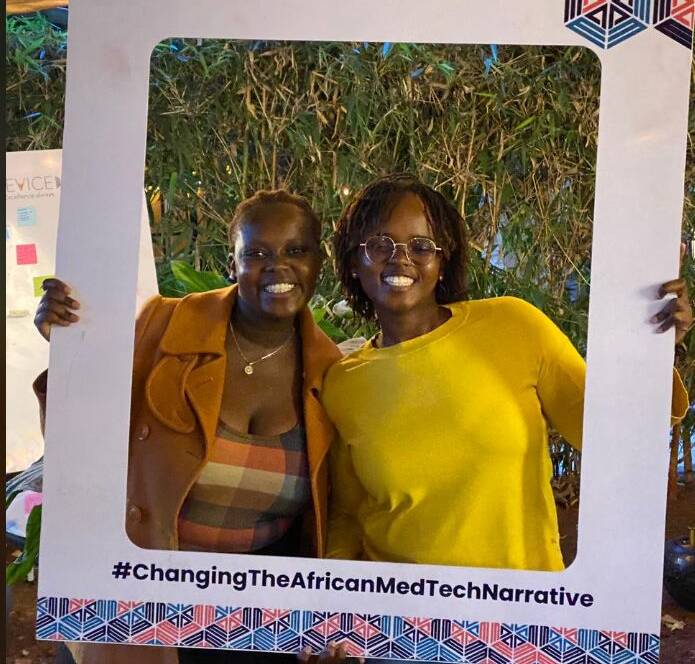In a bold step toward shaping the future of healthcare in Africa, our recent AI Innovation in MedTech For Better Healthcare forum brought together leading experts from technology, law, and medicine to unpack both the transformative potential and the ethical responsibility of artificial intelligence. The forum served as a platform to demystify AI, spotlight local innovation, and emphasize the need for people-first approaches that prioritize patient safety, data privacy, and contextual relevance in the development and deployment of AI-driven health solutions.
Keynote Address: People-First AI for Healthcare
Speaker: Josephine Kaaniru, Legal Researcher, Strathmore University (Centre for Intellectual Property and Information Technology Law – CIPIT)
Opening the session, Josephine Kaoniru grounded the audience in the importance of people-first AI development. She emphasized that patients must remain at the heart of every AI system’s design and deployment. Her keynote focused on the Ethical Data Governance Lifecycle, which she broke down into three core components:
- Data Collection & Consent: Josephine emphasized the importance of freely given, informed, and unambiguous consent, citing the Worldcoin case as an example where consent was invalidated due to monetary incentives.
- Data Privacy: Developers must ensure anonymization of personally identifiable information throughout data curation and model training.
- Algorithmic Bias: She warned against deploying foreign-developed tools in African contexts without localized data, as seen with navigation and assistive technologies that fail due to language and cultural barriers.
In addition, she underscored the role of impact assessments and participatory engagement, advocating for stakeholder involvement at every stage of the AI lifecycle to ensure systems truly address community needs.
On the legal front, Kaaniru stressed that while ethical frameworks exist, they are mostly voluntary. She called for stronger enforcement through binding laws like: The Data Protection Act (2019) and The Digital Health Act (2023)
Finally, she urged institutions to expand their mandates to cover AI in healthcare, pointing to WHO’s 2012 guidance as precedent. She proposed a hybrid governance model integrating co-regulation, self-regulation, and legal compliance.
Startup Spotlight: Therabot’s Journey in AI-Powered Mental Health
Founder: Caleb Jephuneh
Driven by personal experience and systemic gaps in access to mental health services, Caleb Jephuneh shared the story behind Therabot, an AI-driven platform offering emotional support across 84 countries. Therabot addresses the scarcity of trained therapists in Africa, high cost and inaccessibility of therapy and the stigma and cultural silence around emotional wellbeing.
Panel Session: Unlocking AI’s Promise for Health in Africa
Moderated by Wambui Nyabero, the panel discussion tackled the synergy between AI innovation, governance, and equitable healthcare delivery.
Dr. Michael Nzungi
Country Lead, Innovate UK Kenya
Dr. Nzungi spoke on the role of enabling institutions in supporting and de-risking early-stage innovation. He outlined three strategic advantages Africa possesses:
- High unmet health needs, including specialist shortages
- Ability to leapfrog outdated legacy systems
- Flexibility to integrate AI into existing workflows
He highlighted tools like AI-assisted mammography triage and programs like the Public Sector Scaling Action Lab, which supports over 15 counties.
Josephine Kaaniru
Legal Researcher, Strathmore University
Kaaniru emphasized the evolution of governance alongside technology. She reiterated that privacy in Africa is about autonomy, not just data ownership. She advocated for impact assessments at every AI stage and cited Kenya’s National AI Strategy, which stresses a balance between innovation and ethics.
Caleb Jephuneh
Founder, Therabot
Caleb explained Therabot’s transparency-first approach, noting that user data is not used for AI model training—personalization occurs only at the user experience level. He also addressed the legal and technical challenges of using AI in mental health and reaffirmed Therabot’s commitment to data autonomy and ethical compliance.
Conclusion: Towards Responsible AI for Africa’s Health Systems
The forum concluded with a powerful reflection on accountability, patient safety, and the human role in the AI loop. Across the board, speakers emphasized that collaboration, robust governance, and localization are essential to unlocking the full promise of AI in African healthcare.




